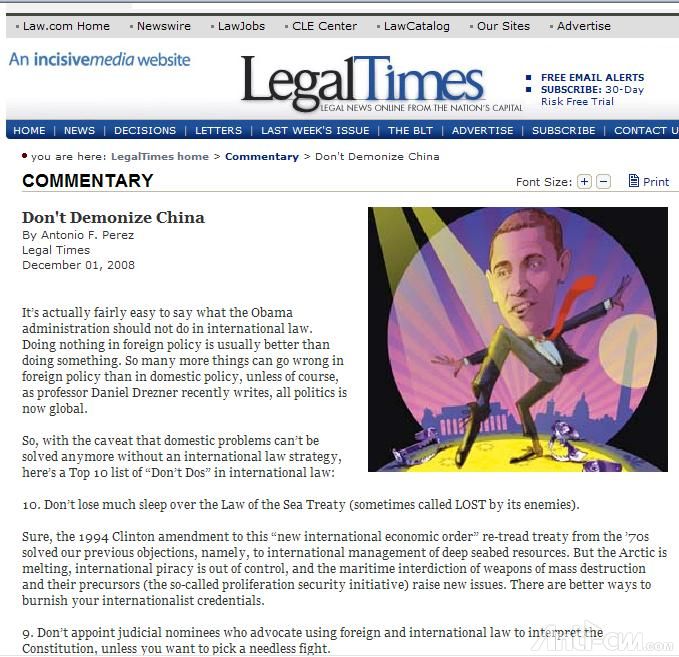|
|
【08.12.1 Law】建议奥巴马的“十不要”-不要妖魔化中国
【原文标题】Don''t Demonize China
【中文标题】不要妖魔化中国
【登载媒体】Law
【来源地址】http://www.law.com/jsp/dc/PubArticleDC.jsp?id=1202426257337
【译者】Gwen
【声明】本翻译供Anti-CNN使用,转载请注明译者及出处,谢谢!
【译文】
不要妖魔化中国
安东尼奥 F Perez
法治时间
12/1/2008

【08.12.1 Law】不要妖魔化中国
【原文标题】Don''t Demonize China
【中文标题】不要妖魔化中国
【登载媒体】Law
【来源地址】http://www.law.com/jsp/dc/PubArticleDC.jsp?id=1202426257337
【译者】Gwen
【声明】本翻译供Anti-CNN使用,转载请注明译者及出处,谢谢!
【译文】
不要妖魔化中国
安东尼奥 F Perez
法治时间
12/1/2008
说出奥巴马政府在国际法里不该做的事,这是非常容易的。在外交政策里无为比有所作为好。外交政策方面比国内政策更易犯错,当然,丹尼尔,Drezner教授最近写到,现在政策都是世界性政策了。
那么,因为警钟已经敲响了——国内问题缺少国际法策略是再也不可能得到解决的,所以,这儿就列出了国际法里十条“不要”
10. 不要对海洋条约法(有时也被对方称为迷失)睁一只闭一眼
当然,1994年克林顿把70年代的法案改善成这个“新国际经济秩序”新条约,这名义上就解决了我们先前拒绝的深海资源进行国际管理。但是北极现在正在融化,国际性海盗问题正在失控,大规模杀伤性武器的海上拦截和他们的先兆(所谓扩散安全倡议)出现了新问题。这正有更好的办法擦亮你的国际主义者证明书。
9. 不要任命那些倡导用外交和国际法释义宪法的司法人员,除非你想挑起一场无谓的战争。
8. 不要任命你控制不了你的人做国务卿,例如,她的名字我不能透露。(呀,我迟了点[希拉里已经确定为国务卿了]。如果这样,最起码有些额外好处:你已经淘汰了2012竞选的主要对手,而且你可以在每次的峰值上唱红脸,她唱白脸。)
7. 不要忽视欧洲的常规军队条约。
这个条约规定了军队在中东地区的活动要提前通知。俄国今年夏天带队进入格鲁吉亚战区。这个条约在这时就起了羁绊作用了。
6. 不要怕展现出你对世界各民族及其作为对话基础价值的了解,
它们是以在真正国际法道德支柱上进行的谈话的基础,甚至即使你的非宗教选民开始认为你真的“有”宗教性,同时伊斯兰教世界厌恶美国的拜金主义(甚至是Pat Buchanan拿着干草叉的农民也认为你投靠了毛拉(伊斯兰教对老师,先生,学者的敬称))
5。不要让你的支持者或伦理学家顾问施加的压力把你禁锢在过度前瞻性法到人道主义干涉的。
不管怎么解释卢旺达发生的事,现在达富尔和刚果东部的情况是需要大的国际部队的。只要别去那就好。把这些问题留着法国。
4. 不要让乔拜登在华盛顿呆太久了。某地总有某人已经死去了。
3. 不要让十年前推荐过埃连冈萨雷斯父亲的白宫律师Gregory Craig负责古马政策。
你可能必须再次赢得佛罗里达州。那么你如果取消仲裁,你就得用大动手段在古巴推行民主制。
小心点。像 Alexis de Tocqueville教导的,糟糕政体的最坏时刻就是当它试着改革自己的时候。不信问问戈巴尔侨夫。如果古巴人民用逃走表示不满,你(不像比尔克林顿面对一船海地人时)可能不会有驻在关塔那海湾一个无保护的难民营。如果你在寻找完美的外交和国内法和政策改革。这就会是的。
2.不要排除修改有于战争法的日内瓦公约的可能。
驳斥非法好战理论的诱惑,和有可以甚至接受关于肯定战俘地位的1997附加议定书,这些可能是不可抗拒的。但是你将会通过关闭关塔纳挣得足够多的印象分了。既然最高法院最起码在一些国外领域上已经扩张了宪法的司法保护权,挣印象分已经失去了其存在的意义了。
那些从高价值囚犯里获得的军事智慧会吓死你。你不会想与国际红十字会签危害美国国家安全的条款。因为你是被选出来的,而他们不是。
你的英雄,亚伯罕林肯,在多数认为是宣布释放是触犯战争法——拒绝John Fremont过早解放侵略密苏里州的叛乱奴役们和他质疑宪法的权威性而要依靠军事学说的必要性这些事上面,慢慢地小心翼翼地取得了大数人的认可。这也包括了温和主义派者也帮助了他。
Burrrus Carnahan关于林肯使用军事委员会起诉丛林开伐者以及用军事手段解放奴隶极好的司法法案(2007)。这部法案远远比早前的那本解释布什政府在为获得法律修改权争取国际支持是怎么完全走错路的简洁书好得多。
但你会发现“做得很精巧”这个词是不够形容老日内瓦规则的,即使你的法律实用主义倾倒向最终会因那时白宫顾问Alberto Gonzalez.终究坚持“对人毫无恶意,对所有人施与仁慈”这个观点得到加强。
1.最后,不要因劳工问题和人权问题而妖魔化中国,不然最终会退出并且会失去信用。
你知道,作为一个律师,把贸易与人权混在一起作为法律问题,这是非常危险的,因为如果你不能区别开哥伦比亚和中国,你将有可能被指责是伪善。当然,中华人民共和国是一个贸易竞争对手,但他同时也是世界经济。认识不到这一点,是很愚笨的。中国现在是马德琳奥尔布赖特不可或缺的国家中不可或缺的经济体。
多用劝说的方法(也就是中国人叫它“礼”),少一些世界贸易组织制裁(也就是中国人所说的“法”,中国人认为诉诸法律就意味着失败的关系)
毕竟,你,像中国人一样,相信和谐的国际秩序,即使你不同意投降。呀,我是说“和谐”
希望这能帮到你,但是如果不能也别怪我。这就是当总统做的事了。
安东尼奥。佩雷斯目前是美国天主教大学了布法律学院教授。曾在美国国务院法律顾问办公室任职,是美国外交关系委员会以及美洲国家组织法律委员会成员。
【原文】
Don't Demonize China
By Antonio F. Perez
Legal Times
December 01, 2008
It’s actually fairly easy to say what the Obama administration should not do in international law. Doing nothing in foreign policy is usually better than doing something. So many more things can go wrong in foreign policy than in domestic policy, unless of course, as professor Daniel Drezner recently writes, all politics is now global.
So, with the caveat that domestic problems can’t be solved anymore without an international law strategy, here’s a Top 10 list of “Don’t Dos” in international law:
10. Don’t lose much sleep over the Law of the Sea Treaty (sometimes called LOST by its enemies).
Sure, the 1994 Clinton amendment to this “new international economic order” re-tread treaty from the ’70s solved our previous objections, namely, to international management of deep seabed resources. But the Arctic is melting, international piracy is out of control, and the maritime interdiction of weapons of mass destruction and their precursors (the so-called proliferation security initiative) raise new issues. There are better ways to burnish your internationalist credentials.
9. Don’t appoint judicial nominees who advocate using foreign and international law to interpret the Constitution, unless you want to pick a needless fight.
8. Don’t appoint as secretary of state somebody you can’t control, such as she-who-must-not-be-named. (Oops, I may be too late. If so, at least there are plus sides: You may have eliminated a primary challenge in 2012, and you can play good cop to her bad cop at every summit meeting.)
7. Don’t ignore the Treaty on Conventional Forces in Europe, which requires advance notification of troop movements in Eastern and Central Europe. The Russians conveniently suspended it just before moving forces to the Georgia theater of operations last summer. Treaties as tripwires make sense.
6. Don’t be afraid to show your knowledge of the various religions of the world and their values as a basis for dialogue on the moral underpinnings of a truly international law, even if your secular constituents begin to think you really “get” religion as well as the Islamic world’s disgust with American materialism (and even if Pat Buchanan’s peasants with pitchforks initially think you’ve sold out to the mullahs).
5. Don’t let the moral pressure from your supporters or moralist advisers lock you into a too-forward-leaning approach to humanitarian intervention. By any reasonable interpretation of what happened in Rwanda, the situations in Darfur and the eastern Congo today require massive international force. Just don’t go there. Leave it to the French.
4. Don’t let Joe Biden stay in Wash ing ton too long. Somebody must have died somewhere.
3. Don’t let your White House counsel Gregory Craig, who also counseled Elián González’s father almost 10 years ago, run Cuba policy. You may have to win Florida again. So if you lift sanctions, couple it with a grand strategy to promote democracy in Cuba.
But be careful. The worst time for a bad regime, as Alexis de Tocqueville taught, is when it’s trying to reform itself. Just ask Mikhail Gorbachev. And if the Cuban people vote with their flippers, you (unlike Bill Clinton when he faced boatloads of Haitians) may not have a habeas-free refugee camp at Guantánamo Bay. If you’re looking for the perfect foreign and domestic law and policy storm, this would be it.
2. Don’t rule out trying to amend the Geneva Conventions on the law of war. The temptation to repudiate the unlawful combatant theory, and perhaps even accept the 1977 Additional Protocol’s attempt to validate POW status, may be irresistible. But you will have earned enough brownie points by closing Gitmo, which has lost its raison d’être anyway now that the Supreme Court has extended constitutional habeas jurisdiction to at least some foreign territory.
The intel obtained from some of the high-value prisoners will scare you to death, and you won’t want to contract out U.S. national security to the bureaucrats of the International Committee of the Red Cross. You get elected; they don’t.
Your hero, Abraham Lincoln, slowly and carefully built consensus for what many then saw as a violation of the laws of war, the Emancipation Procla ma tion—slapping down John Frémont’s premature emancipation of rebels’ slaves in occupied Missouri and posing as a doubter of his constitutional authority to rely on the doctrine of military necessity and thereby inducing moderates to make the case for him.
Burrus Carnahan’s wonderful Act of Justice (2007), about Lincoln’s use of military commissions to prosecute bushwhackers and of the military necessity to free slaves, is far better than a briefing book in explaining how the Bush administration really went wrong in building international support for legal revision.
But you will have to find a better word than “quaint” to describe the old Geneva rules, even if your inclination toward legal pragmatism eventually increases your sympathy for then-White House counsel Alberto Gonzalez. After all, with “malice toward none; with charity for all.”
1. Finally, don’t demonize China for labor and other human rights violations only to have to back off eventually and lose credibility.
You know, as a lawyer, that linking trade to human rights as a matter of law is risky, because you may be accused of hypocrisy if you can’t distinguish Colombia from China. Sure, the PRC is a trade competitor, but it’s the global economy, stupid; and China now is the indispensable economy to Madeleine Albright’s indispensable nation.
Try more persuasion (as the Chinese would call it, li) and fewer World Trade Organization sanctions claims (what the Chinese, who think litigation signifies a failed relationship, would call fa).
After all, you, like the Chinese, believe in a harmonious international order, even if you disagree on the terms for surrender. Oops, I meant “harmony.”
Hope this helps, but don’t blame me if it doesn’t. That’s what it means to be president.
Antonio F. Perez is a law professor at Catholic University’s Columbus School of Law. He is also a former lawyer in the Office of the Legal Advisor at the State Department, a member of the Council on Foreign Relations, and a member of the Inter-American Juridical Committee of the Organization of American States.
[ 本帖最后由 rebecca514 于 2008-12-4 00:47 编辑 ] |
-

评分
-
1
查看全部评分
-
|